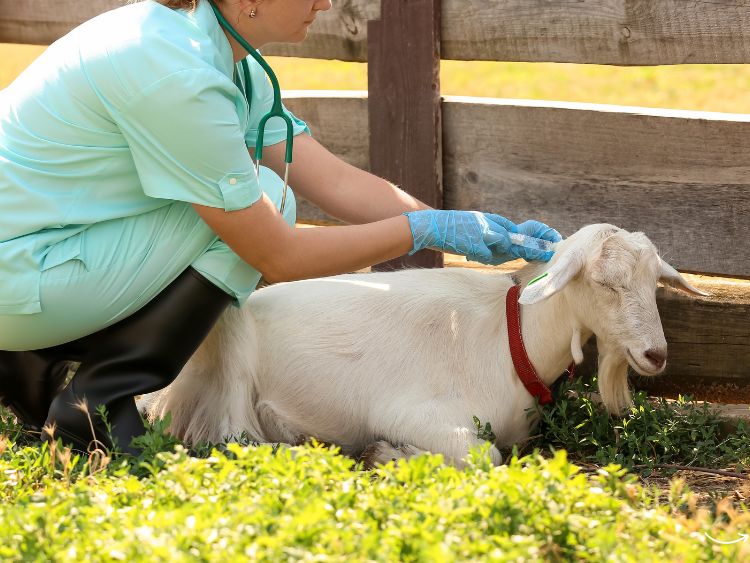When it comes to raising healthy goats, vaccinations play a crucial role. But navigating the world of goat vaccines can be a bit overwhelming, especially if you’re new to goat farming. What’s the right goat vaccination schedule? When should you start vaccinating your kids, and which vaccines are essential? In this comprehensive guide, we’ll answer all these questions and more, ensuring your goats stay in top-notch health.
Understanding the Importance of Vaccinations
Vaccinations are vital for preventing diseases in goats. They work by stimulating the goat’s immune system to produce antibodies against specific pathogens. This process prepares the goat’s body to fight off these diseases if it ever comes into contact with them. Not only do vaccinations protect individual goats, but they also help prevent the spread of diseases within your herd and to neighboring farms.
Common Diseases Prevented by Vaccines
Before diving into the goat vaccination schedule, it’s essential to understand which diseases you’re protecting against. Here are some of the most common:
- Clostridial Diseases: These include tetanus and enterotoxemia, caused by Clostridium bacteria.
- Soremouth (Orf): A contagious viral disease causing sores around the mouth.
- Rabies: A viral disease that affects the nervous system and is fatal once symptoms appear.
- Caseous Lymphadenitis (CL): A bacterial infection causing abscesses in lymph nodes and internal organs.
- Pneumonia: Various bacteria and viruses can cause respiratory infections in goats.
Goat Vaccination Schedule
Now, let’s get into the nitty-gritty of the goat vaccination schedule. Following a proper schedule ensures that your goats receive the protection they need at the right times.
Newborn Kids (0-2 Months)
CDT (Clostridium Perfringens Types C & D and Tetanus)
- First Dose: Administer at 4-6 weeks of age.
- Booster: 3-4 weeks after the first dose.
Soremouth Vaccine (Optional)
- Administer to kids if there’s a history of the disease in your area or on your farm.
Young Kids (3-6 Months)
CDT Booster
- Ensure they receive the booster 3-4 weeks after the initial dose.
Rabies Vaccine
- First Dose: Administer at 3 months of age (if recommended in your area).
Weanlings and Yearlings (6-12 Months)
CDT Annual Booster
- Administer annually after the initial series.
Caseous Lymphadenitis (CL) Vaccine (Optional)
- First Dose: Administer at 6 months of age if the disease is a concern.
- Booster: 3-4 weeks after the first dose, then annually.
Adult Goats (1 Year and Older)
CDT Annual Booster
- Continue with annual boosters to maintain immunity.
Rabies Vaccine
- Administer annually if required in your region.
CL Vaccine (Optional)
- Administer annually if needed.
Special Considerations
Pregnant Does
Vaccinations are crucial for pregnant does to protect both the doe and her unborn kids. Ensure pregnant does are up to date on their vaccinations. Administer a CDT booster 4-6 weeks before kidding to provide passive immunity to the kids through colostrum.
New Additions to the Herd
Quarantine and vaccinate any new goats before introducing them to your herd. This practice helps prevent the introduction of diseases.
Customizing Your Schedule
Consult with a veterinarian to tailor the goat vaccination schedule to your specific herd’s needs. Factors like regional disease prevalence, herd size, and management practices can influence the ideal vaccination plan.
Common Questions About Goat Vaccination Schedule
Why is CDT vaccination important for goats?
CDT vaccination protects against Clostridium perfringens types C and D, which cause enterotoxemia, and Clostridium tetani, which causes tetanus. These diseases are often fatal, making vaccination essential.
Can I skip the soremouth vaccine?
If soremouth is not common in your area and you practice good biosecurity, you might skip this vaccine. However, consult your vet to make an informed decision.
How often should adult goats be vaccinated?
Adult goats should receive an annual booster of the CDT vaccine. Other vaccines like rabies and CL should be administered as per local regulations and herd health requirements.
What should I do if I miss a scheduled vaccination?
If you miss a vaccination, consult your vet for guidance. In most cases, you can administer the missed dose as soon as possible and adjust the schedule accordingly.
Are there side effects to goat vaccinations?
Most goats tolerate vaccinations well. Mild side effects like swelling at the injection site or slight fever can occur but usually resolve quickly. Severe reactions are rare.
Tips for Successful Vaccination
- Keep Records: Maintain detailed records of each goat’s vaccination history.
- Use Clean Equipment: Always use sterile needles and syringes.
- Follow Dosage Instructions: Ensure you administer the correct dose as per the vaccine manufacturer’s guidelines.
- Store Vaccines Properly: Keep vaccines refrigerated and handle them according to the manufacturer’s instructions.
- Monitor After Vaccination: Observe goats for any adverse reactions post-vaccination and consult a vet if necessary.
Conclusion
A well-planned goat vaccination schedule is fundamental to maintaining a healthy herd. By vaccinating your goats at the right times, you safeguard them against potentially deadly diseases and ensure their well-being. Always consult with a veterinarian to tailor your vaccination plan to your specific needs, and keep accurate records to track your herd’s health.
Authoritative Links
- American Association of Small Ruminant Practitioners: https://www.aasrp.org
- USDA Animal and Plant Health Inspection Service: https://www.aphis.usda.gov
- Merck Veterinary Manual: https://www.merckvetmanual.com
- Goat Vaccination Guidelines: https://www.goatworld.com/articles/vaccination
By following these guidelines, you can ensure your goats remain healthy and productive, contributing to the overall success of your farm. Happy farming!
This article aims to provide a comprehensive guide on the goat vaccination schedule, ensuring you have all the information needed to keep your herd healthy. With a focus on active voice and engaging writing, this piece is designed to be both informative and enjoyable to read.





